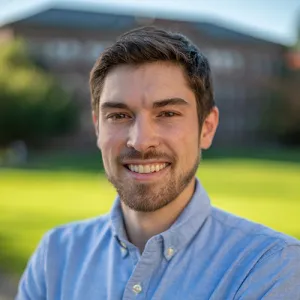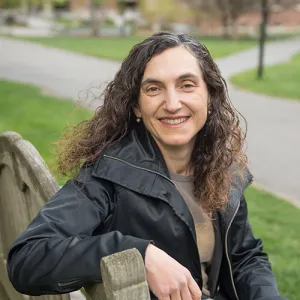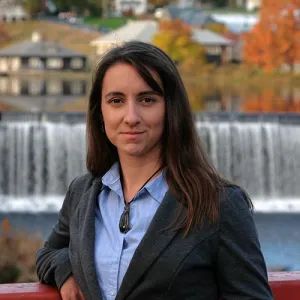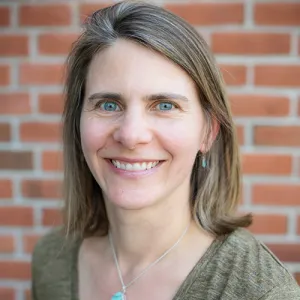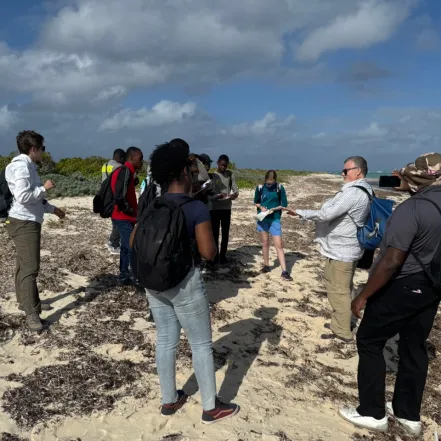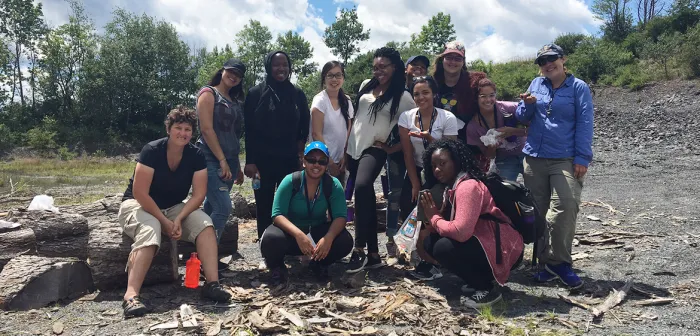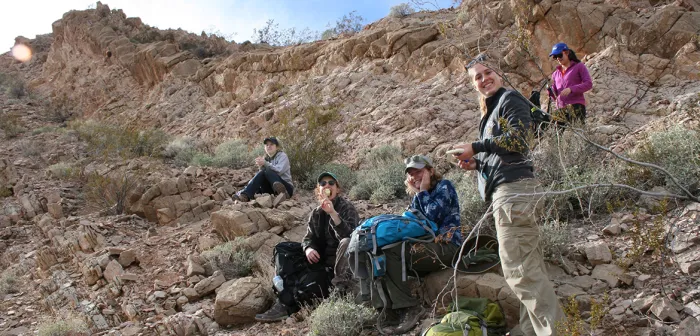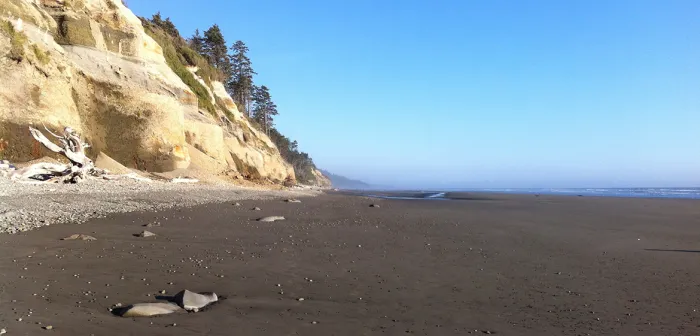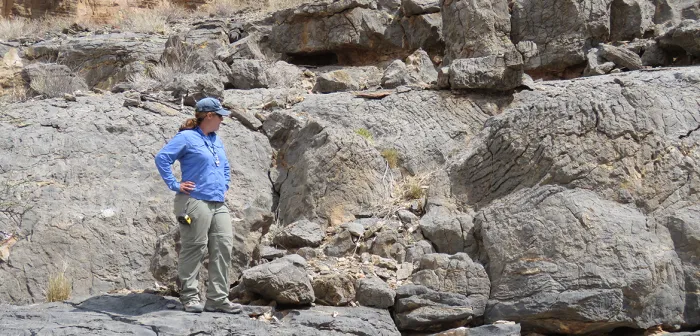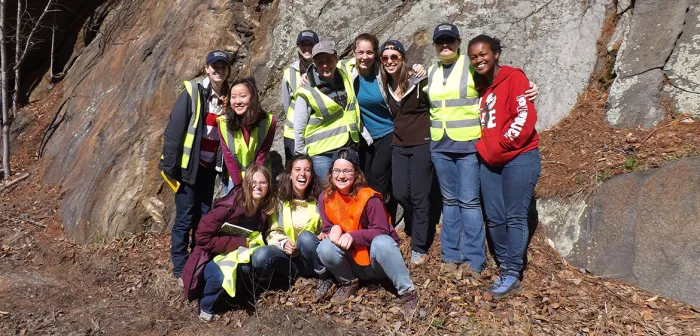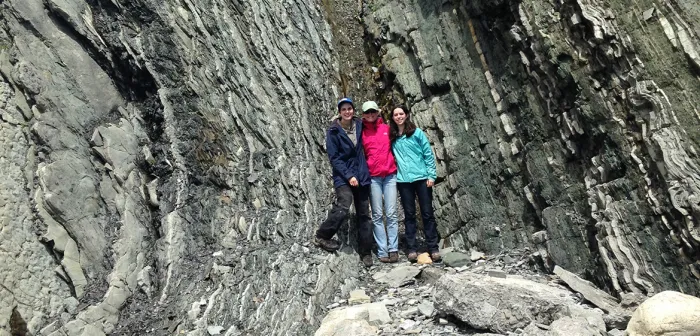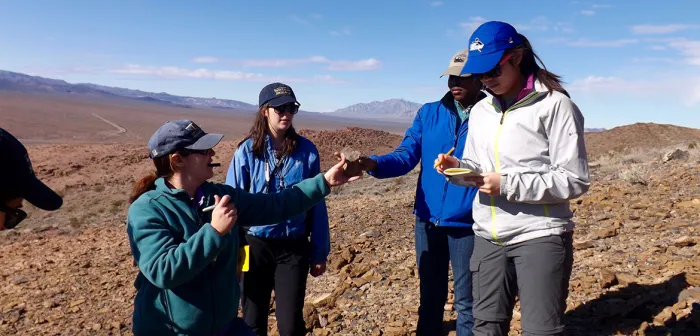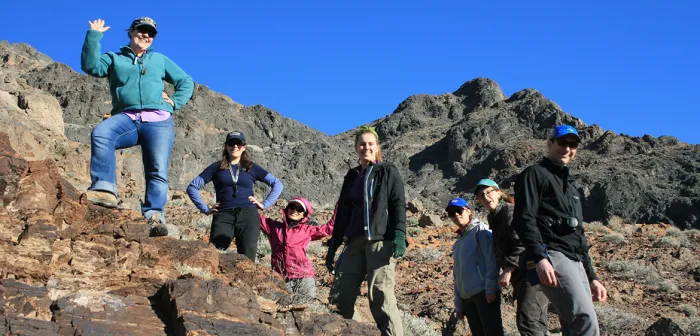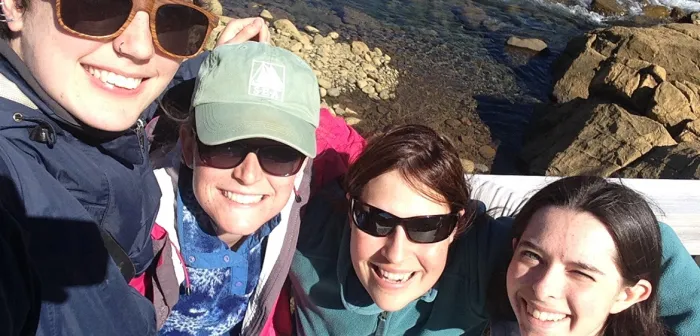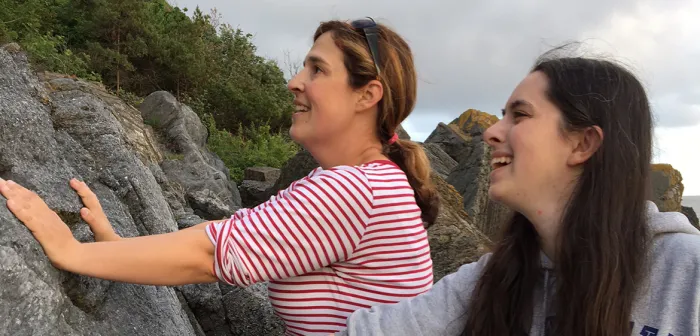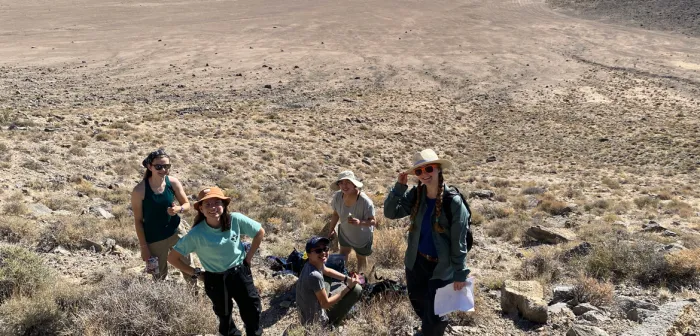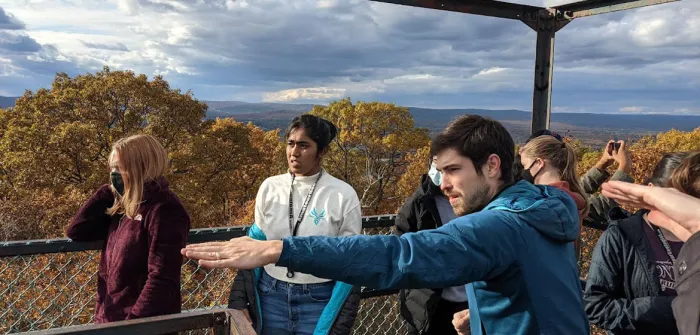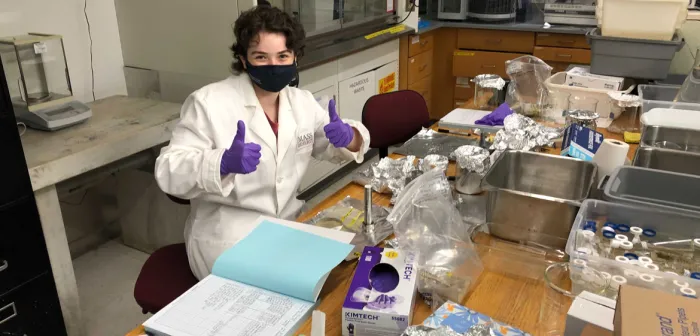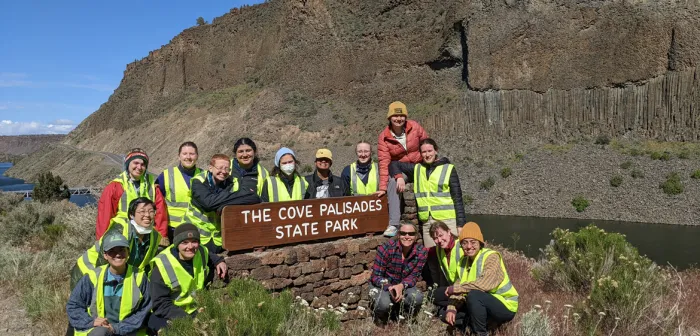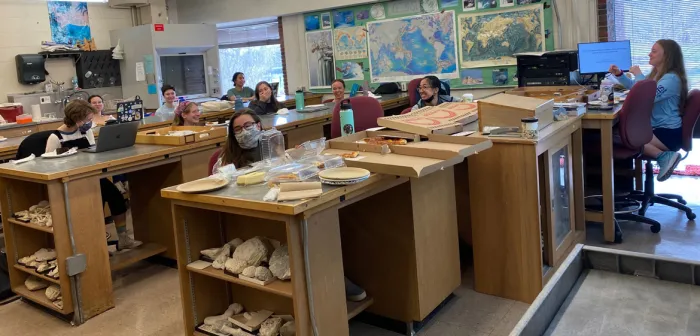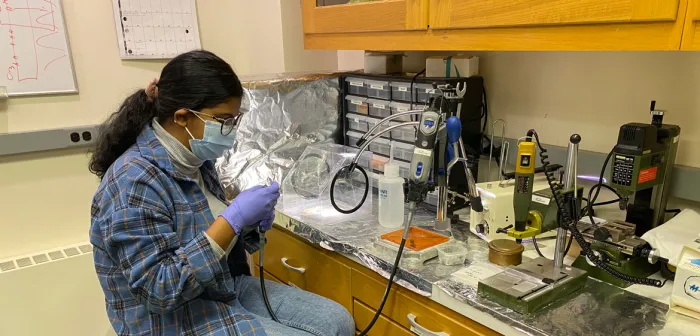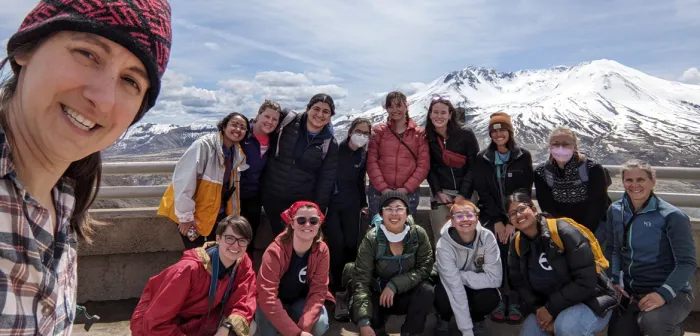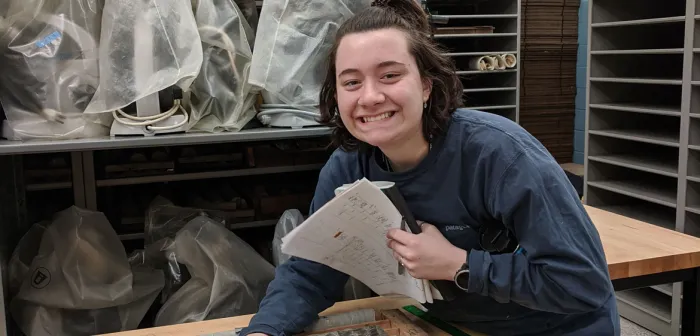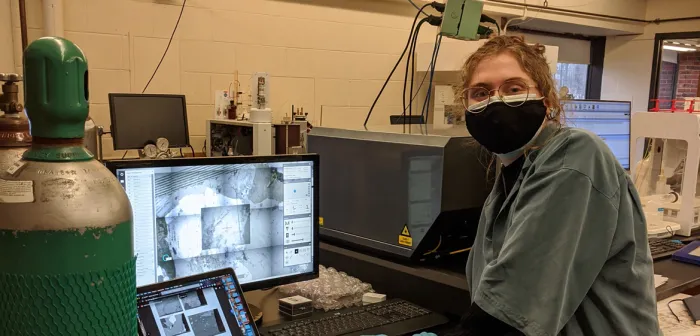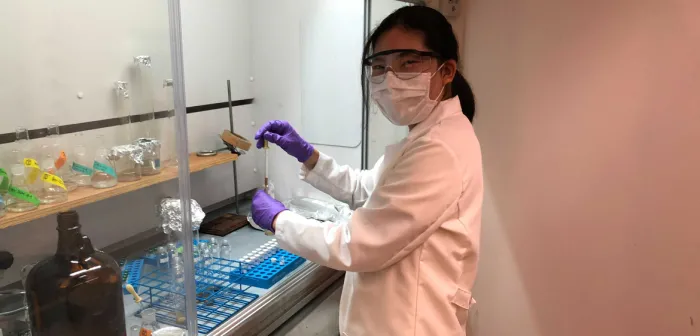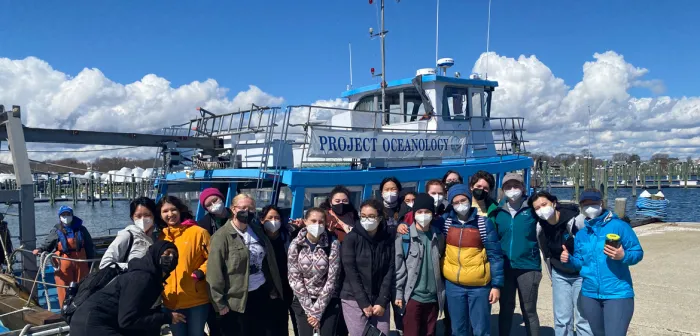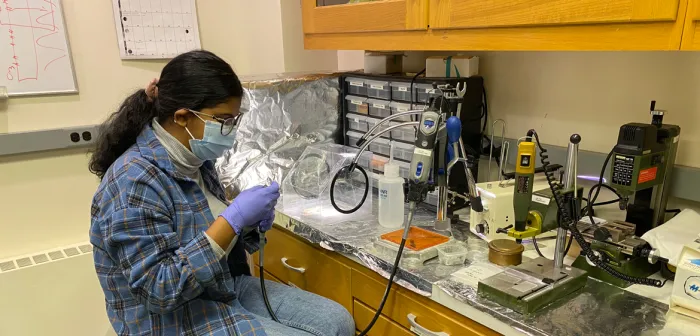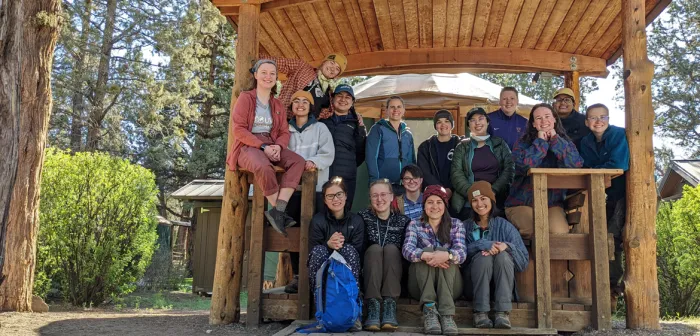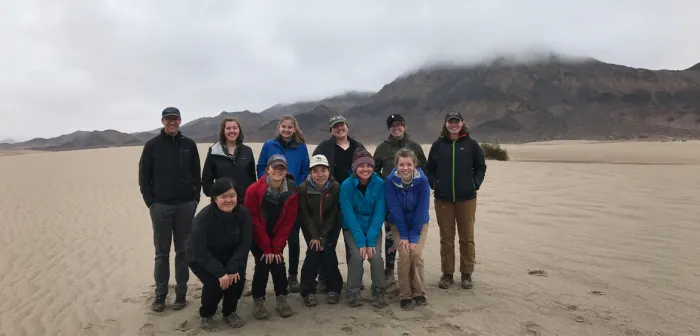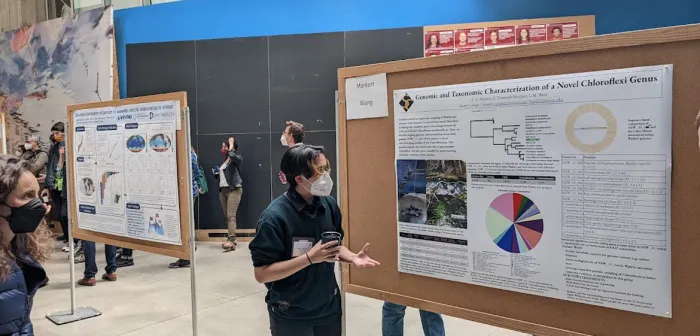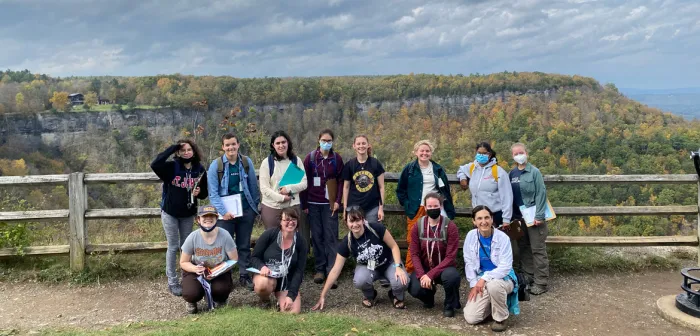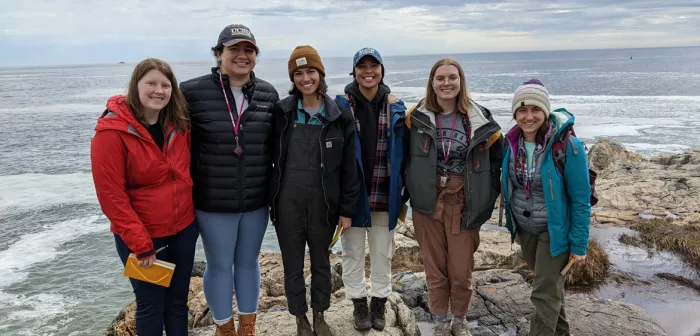
Geosciences
Why study geosciences? Because the Earth is fascinating! Our planet is geologically dynamic, with 4.5 billion years of history and a future we want to protect. Studying geosciences at Smith means you’ll learn to the fullest extent possible how the Earth works. You’ll explore multiple disciplines, including geology, biology, chemistry, physics and math. Courses highlight hands-on and discovery-based learning by doing, modern field and laboratory techniques, and interactive student-faculty research experiences. A degree in geosciences can lead to a variety of rewarding careers that address pressing issues, including climate change, energy and water resources, environmental stewardship and natural hazards.
Department Updates
Geoscience Email Updates
Want to stay up-to-date on the latest news, events, and opportunities in the geosciences department? Of course you do! Sign up for our email lists for students and alums.
For students interested in declaring the major or minor, please be aware that as of November 1, 2025, we have modified our requirements.
For all four tracks of the major as well as the minor, the basis will be GEO 101, or GEO 108, or GEO 102 and one other 100-level geoscience course.
Requirements & Courses
Goals for Geosciences Majors
- Are able to integrate ideas and knowledge from a variety of areas within geosciences and other sciences and programs.
- Can write well and speak clearly and coherently.
- Are able to critically read and understand scientific literature.
- Know how to define and address research problems individually and as part of a team.
- Can collect and properly utilize geological data from the field and laboratory.
- Know how to solve problems using geological data, including specimens and maps.
- Are able to use resources and technology to access, display and analyze data.
- Can think creatively and reach conclusions based on a limited data-base.
Geosciences Major
Geoscience Track
Requirements
- Basis: GEO 101 and GEO 102, or GEO 108, or GEO 102 and one other 100-level geoscience course
- Six intermediate-level geoscience courses (minimum of 28 credits): GEO 209, GEO 221, GEO 222, GEO 231, GEO 232, GEO 241 and GEO 251
- Two 300- or 400-level geoscience courses (minimum of 8 credits), including but not limited to: GEO 301, GEO 302, GEO 311, GEO 334, GEO 341, GEO 361, GEO 399. Students may use up to 4 credits of special studies (minimum of 2 credits per semester) to partially satisfy this requirement. Crosslisted 300-level courses in engineering and astronomy may count for one course. One 4- to 6-credit summer geology field camp may count for one course.
Environmental Geoscience Track
Requirements
- Basis: GEO 101 and GEO 102, or GEO 108, or GEO 102 and one other 100-level geoscience course
- Two chemistry courses.
- No more than one course at the 100 level
- GEO 301 may count for one course
- One ecology course with lab: BIO 130/BIO 131, BIO 268/BIO 269, BIO 266/BIO 267 or BIO 364/BIO 365
- One environmental policy or social science course (minimum 4 credits) that relates environmental processes to societal issues, as approved by the major adviser. Courses could be selected from the areas of anthropology, economics, environmental science and policy, landscape studies, government or sociology.
- Four intermediate-level geoscience courses, at least three of which include a lab (minimum of 19 credits): GEO 209, GEO 221, GEO 222, GEO 231, GEO 232, GEO 241 or GEO 251
- Two 300- or 400-level geoscience courses (minimum of 8 credits), including but not limited to: GEO 301, GEO 302, GEO 311, GEO 334, GEO 341, GEO 361, GEO 399. Students may use up to 4 credits of special studies (minimum of 2 credits per semester) to partially satisfy this requirement. Crosslisted 300-level courses in engineering and astronomy may count for one course. One 4- to 6-credit summer geology field camp may count for one course.
- GEO 301 may count for either for the chemistry requirement or this elective requirement, but not both.
Geobiology Track
Requirements
-
Basis: GEO 101 and GEO 102, or GEO 108, or GEO 102 and one other 100-level geoscience course
-
Two intermediate or upper-level biological sciences courses, above the 100 level, at least one of which should have a lab (minimum of 8 credits)
-
Four intermediate-level geoscience courses, at least three of which include a lab (minimum of 19 credits): GEO 209, GEO 221, GEO 222, GEO 231, GEO 232, GEO 241 or GEO 251
-
Two 300- or 400-level geoscience courses (minimum of 8 credits), including but not limited to: GEO 301, GEO 302, GEO 311, GEO 334, GEO 341, GEO 361, GEO 399. Students may use up to 4 credits of special studies (minimum of 2 credits per semester) to partially satisfy this requirement. Crosslisted 300-level courses in engineering and astronomy may count for one course. One 4- to 6-credit summer geology field camp may count for one course.
Educational Geoscience Track
Requirements
- Basis: GEO 101 and GEO 102; or GEO 108; or GEO 102 and one other 100-level geoscience course
- Three education courses: EDC 238, EDC 347, EDC 352 or EDC 390
- Six additional geoscience courses above the 100 level.
- At least one course must be at the 300 level, including but not limited to: GEO 301, GEO 302, GEO 311, GEO 334, GEO 341, GEO 361, GEO 399. One 4- to 6-credit summer geology field camp may count for one course.
Major Requirement Details
- All courses satisfying a major requirement at the 200 level or above, whether inside or outside the department, must be taken for a letter grade.
- The educational geosciences track does not lead to educator licensure. Students who wish to satisfy licensure requirements would need to take all EDC courses listed above, plus additional courses, and should consult with a faculty member of the Department of Education and Child Study.
- Smith courses that satisfy the advanced-level course requirement include any 300-level geoscience course, EGR 315, EGR 340, EGR 312, or GEO 400. Appropriate courses taken at other institutions also may qualify, as does a 4- to 6-credit geology field camp.
- A summer field course is strongly recommended for all majors and is a requirement for admission to some graduate programs.
- Majors planning for graduate school will need introductory courses in other basic sciences and mathematics.
- Prospective majors should see a departmental adviser as early as possible.
Honors
Honors students must complete all the 100-level and 200-level requirements for one of the three geosciences tracks, at least one 300-level class, plus an honors thesis, GEO 430D or GEO 432D. Please consult the director of honors or the departmental website for specific requirements and application procedures.
The Minor
Requirements
Twenty-four credits
- Basis: GEO 101
and GEO 102
, or GEO 108,
or GEO 102
and one other 100-level geoscience course - Electives to total 24 credits
- All courses that fulfill minor requirements should be taken within the geosciences department at Smith College, but courses transferred from a different institution may be accepted with departmental approval.
- No more than 14 credits can be at the 100 level.
All courses satisfying a minor requirement at the 200 level or above, whether inside or outside the department, must be taken for a letter grade.
Courses
Students contemplating a major in geosciences should elect GEO 101 and GEO 102, or GEO 108. Another 100-level course may be substituted for GEO 101.
GEO 101 Introduction to Earth Processes and History (4 Credits)
Geology is a study of the Earth. In this course, students examine the processes that formed the Earth and that have continued to change the planet during its 4.57 billion year history. In rocks, minerals and the landscape, geologists see puzzles that tell a story about Earth’s past. Students develop their geologic observation skills. The class investigates the origins of minerals and rocks and the dynamic processes that form volcanoes, cause earthquakes, shape landscapes, create natural resources and control the climate—today as well as during the Earth’s past. Students learn to view the Earth with a new perspective and appreciate how the planet is constantly changing, even if at extremely slow rates. Students planning to major in geosciences should take GEO 102 concurrently. Natural Science
Fall
GEO 102 Exploring the Local Geologic Landscape (2 Credits)
The Connecticut Valley region is rich with geologic features that can be reached by a short van ride from Smith. This is a field-based course that explores geology through weekly trips and associated assignments during which students examine evidence for volcanoes, dinosaurs, glaciers, rifting continents, and Himalayan-size mountains in Western Massachusetts. This class, when taken in conjunction with any other 100-level course, can serve as a pathway to the Geoscience major. Preference given to students taking GEO 101 concurrently and students who have previously taken a Geoscience course. Enrollment limited to 17. Natural Science
Fall
GEO 104 Global Climate Change: Exploring the Past, the Present and Options for the Future (4 Credits)
This course provides the basic scientific background on how human activity is altering the planet. The class examines the modern climate system, how it has changed throughout the course of Earth’s history, and how to predict what might happen in the future. Students answer questions such as “What did the planet look like the last time carbon dioxide levels in the atmosphere were this high?” and “What on Earth is geoengineering?”. The goal of this class is to provide the context and scientific understanding needed to address climate change effectively. Natural Science
Fall
GEO 108 Oceanography: An Introduction to the Marine Environment (4 Credits)
An introduction to the global marine environment, with emphasis on the carbon cycle, seafloor dynamics, submarine topography and sediments, the nature and circulation of oceanic waters, ocean-atmosphere-climate interactions and global climate change, coastal processes, marine biologic productivity, and issues of ocean pollution and the sustainable utilization of marine resources by humans. One required field trip. Natural Science
Spring
GEO 209 Water and Hydrogeologic Systems (4 Credits)
Water is a critical resource for sustaining ecosystems and human needs. This course takes a scientific view of all aspects of the hydrologic cycle, focusing on processes that move water through Earth’s freshwater system. Discussions include global precipitation patterns, watersheds, rivers and lakes, streamflow, storm water and flooding, surface/groundwater interactions and groundwater flow. Discussions address human usage and contamination of water with an eye toward protecting water quality and supply. Students work with real hydrologic data from case studies. Prerequisites: GEO 101 and GEO 102, GEO 108, or GEO 102 and any other 100-level GEO lecture course. Enrollment limited to 20. Natural Science
Fall
GEO 221 Mineralogy (5 Credits)
A project-oriented study of minerals and the information they contain about planetary processes. The theory and application to mineralogic problems of crystallography, crystal chemistry, crystal optics, x-ray diffraction, quantitative x-ray spectroscopy and other spectroscopic techniques. The course normally includes a weekend field trip to see minerals in the field. Prerequisite: GEO 101 and GEO 102; GEO 108; FYS 103; or GEO 102 with any other GEO 100-level course. GEO 102 can be taken concurrently. Recommended: CHM 111 or equivalent. Enrollment limited to 18. Natural Science
Spring
GEO 222 Petrology (5 Credits)
An examination of typical igneous and metamorphic rocks in the laboratory and in the field in search of clues to their formation. Lab work emphasizes the microscopic study of rocks in thin sections. The course normally includes a weekend field trip (e.g. Cape Ann or Vermont) which is an important part of the course. Prerequisite: GEO 108 or (any GEO 100-level course and GEO 102 (may be concurrent)); and GEO 221, or equivalent. Enrollment limited to 18. Natural Science
Fall
GEO 223 Geology of Active Volcanoes (1 Credit)
A field-based course to examine volcanic materials and processes at locations with active volcanoes, such as Oregon, Hawaii, Costa Rica, Iceland and Italy. Discussions include eruptive styles and cycles; magmatic evolution; lava fountains, flows, lakes, and tubes; normal faulting; crater formation; landscape development; and destruction. Participants must be physically fit and prepared for considerable hiking in rough terrain. Prerequisites: completion of an introductory level geology course. Preference given to Geosciences majors. Enrollment limited to 15. Instructor permission required. Natural Science
Spring, Variable
GEO 231 Invertebrate Paleontology and the History of Life (5 Credits)
A study of the major evolutionary events in the history of life, with a special focus on marine invertebrates. Special topics include evolution, functional adaptations, paleoenvironments, the origin of life, mass extinction and origination, and how life has changed through time. One weekend field trip (optional). Prerequisite: GEO 101 and GEO 102; GEO 108; or GEO 102 with any other GEO 100-level course. GEO 102 can be taken concurrently; open also to students who have fulfilled the basis for the BIO major. Enrollment limited to 18. Natural Science
Fall
GEO 232 Sedimentary Geology (5 Credits)
A project-oriented study of the processes and products of sediment formation, transport, deposition and lithification. Modern sediments and depositional environments of the Massachusetts coast are examined and compared with ancient sedimentary rocks of the Connecticut River Valley and eastern New York. Field and laboratory analyses focus on the description and classification of sedimentary rocks, and on the interpretation of their origin. The results provide unique insights into the geologic history of eastern North America. Two weekend field trips. Prerequisites: GEO 101 and GEO 102; GEO 108; or GEO 102 with any other GEO 100-level course. GEO 102 can be taken concurrently. Enrollment limited to 22. Natural Science
Fall
GEO 241 Structural Geology (5 Credits)
The study and interpretation of rock structures with emphasis on the mechanics of deformation, behavior of rock materials, methods of analysis and relationship to plate tectonics. Laboratories involve computer-based analysis of the map patterns of geologic structures, the mechanics of their formation and field trips during the lab period to connect local examples of structures to New England tectonics. Prerequisite: GEO 101 and GEO 102, or GEO 108, or FYS 103, or GEO 102 with any other GEO 100-level course. Enrollment limited to 20. Natural Science
Spring
GEO 251 Geomorphology (5 Credits)
The study of landforms and their significance in terms of the processes that form them. Selected reference is made to examples in the New England region and the classic landforms of the world. During the first part of the semester laboratories involve learning to use geographic information system (GIS) software to analyze landforms. During the second part of the semester laboratories include field trips to examine landforms in the local area. Prerequisite: GEO 101, GEO 102, GEO 108 or FYS 103. Enrollment limited to 18. Natural Science
Spring
GEO 301 Aqueous Geochemistry (5 Credits)
This project-based course examines the geochemical reactions between water and the natural system. Water and soil samples collected from a weekend field trip serve as the basis for understanding principles of pH, alkalinity, equilibrium thermodynamics, mineral solubility, soil chemistry, redox reactions, acid rain and acid mine drainage. The laboratory emphasizes wet-chemistry analytical techniques. One weekend field trip. Prerequisites: One geosciences course and (CHM 111 or CHM 118). Enrollment limited to 16. Natural Science
Spring
GEO 302 Field Studies of the Desert Southwest (5 Credits)
This field-oriented course examines the diverse stratigraphic record of mass extinction and Snowball Earth as well as structural complexities preserved in Death Valley and adjacent areas. A required week-long field trip takes place in January followed by a semester-long course in the spring semester. Field analyses include measuring stratigraphic sections and field mapping. Prerequisites: GEO 231 or GEO 232 or GEO 241. Enrollment limited to 10. Instructor permission required. Natural Science
Spring, Variable
GEO 311 Modeling the Earth: Data Analysis in the Geosciences (4 Credits)
Major advances in understanding of Earth’s physical processes have been made through analysis and interpretation of datasets, including precise tracking of plate tectonic motions, the rate and significance of modern climate change and sea level rise, and the timing and environmental conditions of extraordinary events in Earth history. This course introduces programming and analysis skills using Python to import, query, model and visualize geoscience datasets, with applications drawn from seismology, climate change, hydrology and geochemistry. Prerequisite: GEO 101, GEO 102, GEO 104, GEO 106, GEO 108, GEO 112, a GEO-based FYS or equivalent. Enrollment limited to 20. Natural Science; Mathematics
Fall, Alternate Years
GEO 334 Carbonate Sedimentology (5 Credits)
Students in this class engage in detailed studies of the formation of carbonate sediments and rocks through participation in a required 7-10 day field trip to one of the modern tropical carbonate-producing environments (such as the Bahamas) during January interterm, followed by semester-long research projects based on the data and specimens collected in the field. Students present their results at Celebrating Collaborations in April. Class discussion topics include the history of carbonate rocks from the Precambrian to the present. Interested students should contact the course instructor. Students are responsible to partially cover expenses associated with the January trip. Prerequisite: GEO 231 or GEO 232. Enrollment limited to 8. Instructor permission required. Natural Science
Spring, Variable
GEO 341 Seminar: Advanced Studies in Geobiology (4 Credits)
This course examines the record of life from a geobiological perspective. The course covers the interactions between life and the environment from the early Earth through to the Modern. The class explores microbial metabolisms, isotopic systems and their interrelated nature from the Proterozoic to the Recent. Students read recent peer-reviewed papers from the literature to inform class discussions, and students present material in class. Prerequisites: GEO 221 or GEO 231. Restrictions: Juniors and seniors only. Enrollment limited to 12. Instructor permission required. Natural Science; Historical Studies
Fall, Spring, Variable
GEO 361 Tectonics (4 Credits)
A broadly-based examination of tectonics, the unifying theory of geology. The class discusses lithospheric plate movements, the creation and destruction of Earth’s crust, the formation of mountain belts and sedimentary basins, the dynamic coupling of crust and mantle, and how these processes have shaped the Earth through time. Emphases includes critical reading of the primary literature, communication of scientific ideas orally and in writing and the central role of tectonics in uniting diverse fields of geology to create a cogent picture of how the Earth works. Prerequisite: any two 200-level courses in geosciences, one of which may be taken concurrently. Natural Science
Fall, Alternate Years
GEO 399 Research Practicum in Earth History: Inquiry and Collaboration Through Research (4 Credits)
This course enables students to engage with independent research projects in Paleontology, Earth History, and Geobiology, with an emphasis on collaborative work. Some goals of this class are to 1) develop a frame for how scientists build expertise through collaboration; 2) develop skills in team building and problem solving; 3) develop lab research skills and expertise in project design; 4) gather and interpret data in support of a research project; and 5) present the data in a poster presentation. May be repeated once for credit. Enrollment limited to 15. Instructor permission required.
Fall, Spring, Annually
GEO 400 Advanced Work or Special Problems in Geosciences (1-4 Credits)
Instructor permission required.
Fall, Spring
GEO 430D Honors Project (4 Credits)
Department permission required.
Fall, Spring
GEO 432D Honors Project (6 Credits)
Department permission required.
Fall, Spring
Crosslisted Courses
EGR 315 Seminar: Ecohydrology (4 Credits)
This seminar focuses on the measurement and modeling of hydrologic processes and their interplay with ecosystems. Material includes the statistical and mathematical representation of infiltration, evapotranspiration, plant uptake and runoff over a range of scales (plot to watershed). The course addresses characterization of the temporal and spatial variability of environmental parameters and representation of the processes. The course introduces students to the Pioneer Valley, the cloud forests of Costa Rica and African savannas. Prerequisite: MTH 112 and SDS 201, SDS 210, SDS 220 or MTH 246. Restrictions: Juniors and seniors only; Engineering majors only. Enrollment limited to 12.
Fall, Spring, Variable
EGR 316 Seminar: Advanced Topics in Engineering-Green Infrastructure for Water Resources (4 Credits)
Green infrastructure, which integrates natural and engineered components, is becoming increasingly popular to manage water quality and quantity. Green infrastructure examples include permeable pavement, bioretention basins, treatment wetlands and riverbank filtration. This course covers the science and engineering related to green infrastructure design, such as open-channel flow, hydraulics and filtration. Additionally, it investigates how such designs are realized, with attention to siting, specifications and effects on communities. A case study approach is used to evaluate green infrastructure performance. Prerequisites: EGR 374, GEO 209 or GEO 301, or equivalent. Restrictions: Juniors and seniors only. Enrollment limited to 12. Natural Science
Fall, Spring, Variable
EGR 340 Seminar: Geotechnical Engineering (4 Credits)
What is quicksand and can one really drown in it? Why is Venice sinking? In this seminar students are introduced to the engineering behavior of soil within the context of a variety of real-world applications that include constructing dams, roads and buildings; protecting structures from earthquake and settlement damage; and preventing groundwater contamination. Topics covered include soil classification, permeability and seepage; volume changes; and effective stress, strength and compaction. Students use a variety of approaches to learning including discussion, hands-on activities, labs, projects, field trips and in-depth explorations of topics chosen by the students. Prerequisite: EGR 270 or GEO 241. Restrictions: Juniors and seniors only. Enrollment limited to 12. Natural Science
Fall, Spring, Variable
ENV 150/ GEO 150 Mapping our World: An Introduction to Geographic Information Systems (4 Credits)
Offered as GEO 150 and ENV 150. A geographic information system (GIS) enables data and maps to be overlain, queried and visualized in order to solve problems in many diverse fields. This course provides an introduction to the fundamental elements of GIS and applies the analysis of spatial data to issues in geoscience, environmental science and public policy. Students gain expertise in ArcGIS--the industry standard GIS software--and online mapping platforms, and carry out semester-long projects in partnership with campus offices or local conservation organizations. Enrollment limited to 20. Natural Science
Fall
Additional Programmatic Information
Class of 2026
Jack Loveless
Class of 2027
Sara Pruss
Class of 2028
Bosiljka Glumac
Class of 2029
Amy Larson Rhodes (Jack Loveless in 2025/26)
Please see this document and/or consult the director of honors for specific requirements and application procedures.
Honors Director
Jack Loveless
Requirements
Honors students must complete all the 100-level and 200-level requirements for one of the three geosciences tracks, at least one 300-level class, plus an honors thesis, GEO 430D or GEO 432D.
GEO 430D Honors Project
Credits: 4 per semester, 8 for yearlong course
GEO 432D Honors Project
Credits: 6 per semester, 12 for yearlong course
Additional Course Information
Our courses are designed to present an interdisciplinary body of geological knowledge and methodology to the broadest possible range of students. We contribute to programs at Smith where geological input is vital, including archaeology, environmental science, marine science, public policy and engineering. We also provide geological leadership through our cooperation with the Five Colleges and our outreach to local, national and international communities.
Geosciences courses highlight:
- hands-on, discovery-based learning by doing substantial field-based geological inquiry
- modern field and laboratory techniques
- the use of specialized equipment
- interactive student-faculty research experiences
All introductory-level courses are designed for non-science majors but are appropriate for science majors as well.
Consult the Smith College Course Catalog for more information.
Students contemplating a major in geosciences should elect 101 and 102, or FYS 103 or 108, or any 100-level geoscience course and GEO 102. We encourage you to see a departmental adviser as early as possible to learn more about the tracks within the major. Prospective geoscience majors should seriously consider introductory-level courses in chemistry and/or calculus.
Course offerings include:
Fall
- GEO 101 Introduction to Earth Processes and History
- GEO 102 Exploring the Local Geologic Landscape (2 credits)
- GEO 104 Global Climate Change: Exploring the Past, the Present and Options for the Future
- FYS 109 Exobiology and the Search for Life in the Universe
Spring
- GEO 106 Extraordinary Events in the History of the Earth, Life and Climate
- GEO 108 Oceanography: An Introduction to the Marine Environment
Consult the Smith College Course Catalog for more information.
Prospective geoscience majors should seriously consider introductory-level courses in chemistry and/or calculus.
Smith courses that satisfy the advanced-level course requirement include any 300-level geoscience course, Ecohydrology (EGR 315), Seminar: Topics in Astrophysics-Asteroids (AST 330), Mechanics of Granular Media (EGR 340), and advanced work or Special Problems in Geology (GEO 400). Courses taken at other institutions also may qualify, as does a 4- to 6-credit geology field camp.
Consult the Smith College Course Catalog for more information.
Our majors and minors regularly use state-of-the-art field and laboratory facilities for course and research projects. Experience with specialized and sophisticated equipment, much of which is more typical of graduate school departments, provides students with valuable skills for graduate school and the workforce.
Laboratory and Field Facilities
- Spatial Analysis Lab, with remote sensing and Geographic Information Systems (GIS) software
- Center for Aqueous Biogeochemical Research
- Soil and clay mineralogy lab
- Sedimentary models lab
- High-temperature and pressure hydrothermal lab
- Experimental deformation of rocks and modeling rock structures lab
- Fully equipped lapidary and thin-section facilities
- Ada and Archibald MacLeish Field Station
- Paradise Pond hydrologic monitoring station
- Mineral displays and outdoor rock garden
Instruments and Field Equipment
- X-ray diffractometer
- Scanning electron microscope with energy dispersive X-ray spectrometer
- Field geophysical equipment, including a 12-channel seismograph, gravimeter, proton/precession magnetometers and electrical resistivity meter
- Field hydrology equipment, including current meters, data loggers and pressure transducers
- Research-grade petrographic microscopes with cathode luminescence
A summer field course is strongly recommended for all majors and is a requirement for admission to some graduate programs. Majors planning for graduate school will need introductory courses in other basic sciences and mathematics. Prospective majors should see a departmental adviser as early as possible.
Smith Off-Campus Field Experience
Each year the department sponsors an off-campus course designed to offer a field experience that lets geosciences majors and minors observe and study a fascinating area in detail. This course may be entirely during interterm or it may be a spring semester course with a field trip during spring break or the following summer. Courses include Carbonate Systems and Coral Reefs of the Bahamas (270j) and Geology of Hawaii (223j).
Because there are many important geologic features that are not found in New England, geoscience majors are encouraged to take at least one of these courses to add breadth to their geologic understanding.
Field Camp
Attending a field camp is also a recommended experience for all students. Field camps give you the opportunity to apply your classroom and laboratory knowledge directly out in the field, fully engaging in the actual work of a professional geologist. Many, but not all, field camps are run during the summer for three-to-six weeks and allow you to earn credit toward the advanced geoscience requirement of the major.
Summer field camps in geosciences
A variety of summer field courses are offered at locations across the United States and around the world; most emphasize general geologic field methods and mapping, but some focus on specialties such as hydrology, volcanology or geophysics.
GSA/ExxonMobil Bighorn Basin Field Award
This one-week, all-expenses-paid field seminar in the Bighorn Basin of north-central Wyoming emphasizes multidisciplinary, integrated basin analysis.
National Association of Geoscience Teachers (NAGT) Scholarships for Field Study
This organization offers $500 scholarships to support student participation in field-based courses, including (but not limited to) summer field camps. It offers a small number of awards specifically for women geoscience students, sponsored by the Association of Women Geoscientists (AWG).
Juneau Icefield Research Program (JIRP)
This is an exciting summer field project in southeastern Alaska and British Columbia, with emphases on glacier monitoring, glacial landscapes, climate studies and alpine environments. For more information, contact Mark Brandriss in the Department of Geosciences or visit the JIRP website.
Faculty
Staff Instructor
Marc Anderson
Instrument and Techniques Instructor
Emeriti
Geosciences in Action
Contact Department of Geosciences
Burton Hall 115
Smith College
Northampton, MA 01063
